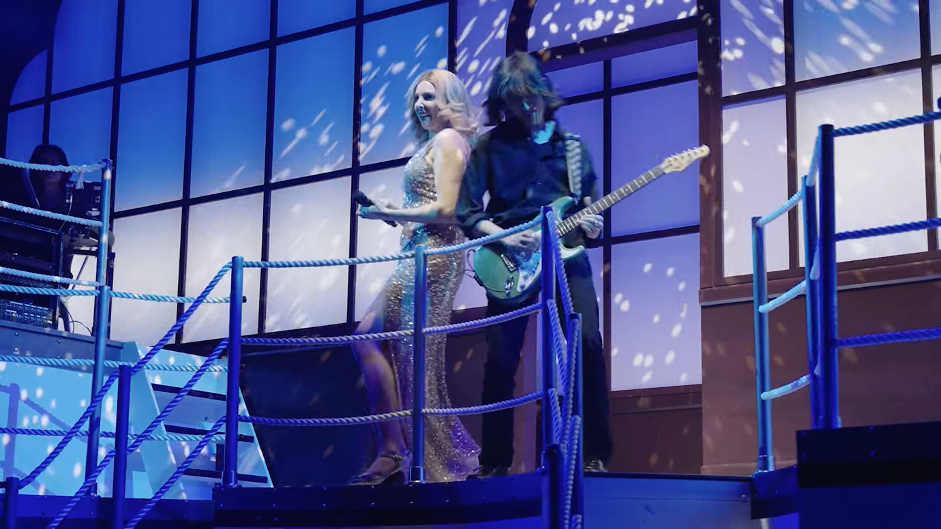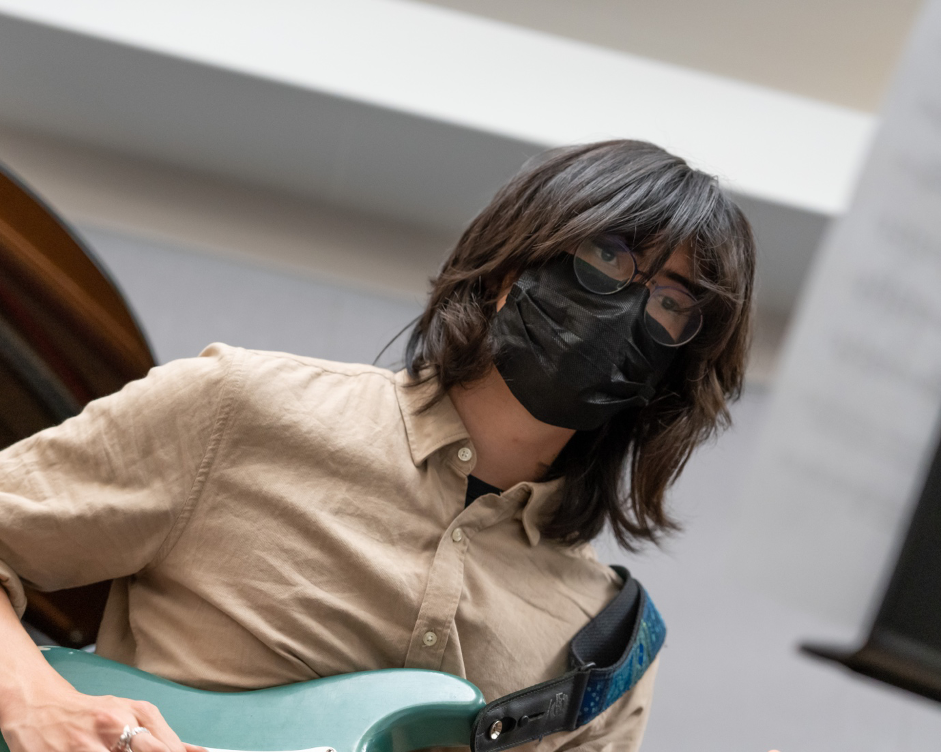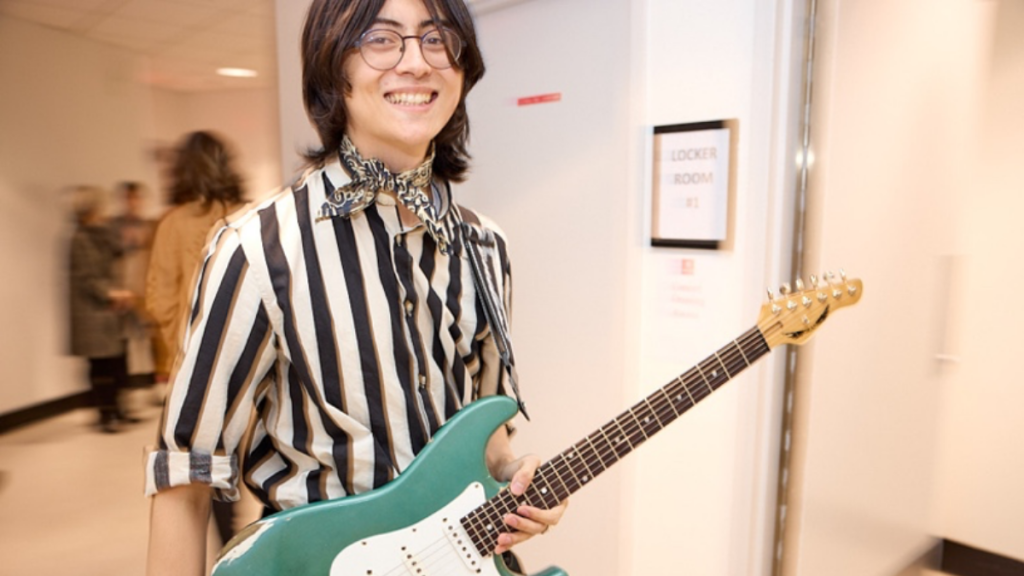In the vast landscape of the music industry today, where the creative process and consumption of music have been radically transformed by digital advancements, there is a perpetual need for talented artists capable of transcending genres and mediums. Enter Alex Mak, a multifaceted musician whose journey exemplifies the vibrancy and adaptability vital to navigating this fluctuating industry.
Born with an inherent love for music, Alex has developed a rich repertoire over the years, playing a range of instruments, including the piano, guitar, bass, drums, and double bass. This diverse instrumental fluency has allowed him to adeptly traverse various musical styles, seamlessly integrating them into his performances and compositions. His breadth of experience underscores his versatility, a trait that has become increasingly critical in the ever-morphing music industry.
Alex played the guitar in “Titanique,” a musical that parodied the movie “Titanic” and used the music of Céline Dion. This is a notable accomplishment in his career. This unique theatrical production has enjoyed immense success, regularly selling out 90–100% of the 270 seats at the prestigious Daryl Roth Theatre – an off-Broadway performance space in Union Square, Manhattan, renowned for hosting award-winning productions. Alex’s talent and dedication have undoubtedly contributed to Titanique’s widespread acclaim from esteemed publications like The New York Times, The Wall Street Journal, and People Magazine.
Adding to his impressive resume, Alex performed with “Titanique” on November 22, 2022, as the musical guest on “Late Night with Seth Meyers,” a popular American late-night talk show with global reach, broadcasted on NBC. This further underlines Alex’s influence in the music industry and highlights his ability to hold his own on both theatrical stages and television screens.
In addition to his accomplishments on stage, Alex has left an indelible mark in music education. His expertise extends to arranging for Yamaha Music Entertainment Holdings. He meticulously recorded all guitar tracks for the Japanese-language music instruction book, “Arranging for Contemporary Music,” authored by Lee Abe. This comprehensive guide explores the diverse sonic and notational techniques of the electric guitar in modern music ensembles. The book features audio examples of Alex’s guitar playing, and these have been published on Yamaha Music Publishing’s Japanese YouTube channel, which boasts 43.1K subscribers and a staggering 27.36 million total channel views.
We had the privilege of interviewing Alex Mak, where we delved deeper into his extraordinary ability to shift between genres, instruments, and roles – a testament to his versatility in the music industry. This broad understanding of different instruments and musical styles has not only shaped his distinctive sound but also solidified his standing as a consummate professional in a multifaceted industry.
Hi, Alex! We’re so excited to have you here today. Before anything else, could you describe how your ability to play multiple instruments has helped shape your musical style and versatility?
Different instruments can be compared to multiple windows overlooking the same courtyard of music. Each one offers a unique perspective, making some aspects easier to grasp than others. The instincts I rely on when playing the guitar have been honed from my experiences with numerous instruments. When I collaborate with others musically, understanding their backgrounds and skills becomes crucial in providing them with the right support.
Can you share an instance when your skills with multiple instruments significantly contributed to a piece of music or performance?
It happens all the time! For example, when I arranged a piece for Berklee’s 2022 Commencement Concert, I had the opportunity to write for a large, diverse ensemble. I crafted a medley of Steely Dan tunes in tribute to the legendary Chuck Rainey, complete with a solid rhythm section, horns, and background vocalists – truly the works!
In crafting this piece, my primary intention was to bring the bass to the forefront as a tribute to Chuck. My bass playing experience guided me in transcribing his bass lines note for note. Then, I ingeniously translated many of those motifs to other instruments. My aim was not merely to cut and paste, but to adapt the parts in a way that was fitting and coherent for the respective musicians. Having played various instruments, I had developed an instinctual understanding of what worked. I also dialogued with the performers to solidify things, further ensuring the piece made sense and resonated.
How do you manage to incorporate different genres into your music and performances? Can you share an example?
I typically don’t consciously blend genres, but whenever I perform, I bring my entire musical history and influences into play. I have gleaned equal wisdom from every musical endeavor I’ve engaged in, and these experiences have irrevocably shaped me as an individual.
A significant part of my improvisation lies in melody, and my sources of inspiration for this are incredibly varied. Whether it’s a song I learned for a wedding last month, the rock anthems of my youth, symphonies I performed in high school, or the ragas I studied at Berklee, all of these experiences influence my creative process and the way I develop musical ideas in the moment.
How has your versatility in playing different instruments influenced your role in “Titanique” and other performances?
I believe the greatest benefit of being versatile is the enhancement of communication. While I never play two instruments simultaneously, staying aware of my surroundings helps me understand what’s being performed.
In the case of Titanique, the drum and keyboard parts aren’t alien to me. I understand how they would feel under my hands. My approach is to complement these elements, while creating minor components that could serve as a springboard for the rest of the band.

How does your broad understanding of musical styles impact your compositions? Could you provide an example where this was particularly evident?
I avoid writing within a musical idiom with which I’m not familiar. Doing so feels disrespectful both to the tradition itself and to the listener. Interestingly, I’ve found that simply listening to music can often be as beneficial as physically practicing an instrument!
When I compose, my mind becomes a library filled with my favorite pieces of music. While this collection spans various genres, each piece shares the common thread of being something I truly love. For my original compositions, I often blend newer inspirations, such as avant-garde and non-Western music, with older friends like jazz and country, as well as rock and blues foundations. The end result, I hope, harmoniously merges into a singular, unique piece of music.
Do you have a favorite genre or instrument to play? How does it showcase your versatility as a musician?
I remain enamored with the rock electric guitar – it’s my musical home base, and I have no intention of abandoning it. There’s a captivating simplicity to my favorite guitarists, coupled with a robust and confident feel to their playing. Achieving that rhythm guitar feel is deceptively challenging.
Learning to embody that vibe has instilled in me a deep respect for the importance of a genre’s unique feel. Even though I may always be perceived as a rock player performing in genre X, my aim is to be that rock musician who truly adores it and persistently strives to capture the essence of its vibe.
Has there been a moment in your career when you had to switch roles or instruments suddenly? How did your versatility help in that situation?
Entering high school, I was primarily a guitarist who also dabbled in piano, bass, and drums. I had a deep love for music and was eager to continue my education in it. My region offered specialized high school music programs, but none specifically catered to guitar. Consequently, I began learning the double bass a few months before the auditions for these programs.
The experience was both humbling and challenging. By the time of the auditions, I was far from being an accomplished player, but I was lucky enough to be accepted and given the opportunity to continue my musical journey. I made rapid progress, drawing parallels between the double bass and the instruments I was already familiar with. Much of what I learned was transferable, reinforcing the idea that every musical experience informs and enhances others.

How do you approach learning a new instrument or genre? Can you describe a time when this skill significantly influenced a project or performance?
When it comes to melodic instruments, my first step is to figure out the melodies. If I can grasp that, I can manage when improvising. Next, I tackle chords in order to understand the instrument’s architecture. As I grow more comfortable, I apply all I’ve learned to songs and study great players of the instrument to gain a deeper understanding of the feel and technique.
The mastery of genres is largely about attentive listening, followed by self-comparison and adjustment based on what I’ve heard. Everything I undertake is a work in progress, but my aim is to bring everything to a functionally proficient level as quickly as possible.
The world of theater guitar is unique due to the common practice of writing for “doubles” – additional instruments that a musician might be asked to play. Mandolin, banjo, and ukulele are frequently featured. Thanks to my learning approach, I was able to quickly pick up the mandolin for a recording session, and I learned to play the lap steel as my love for country music blossomed.




